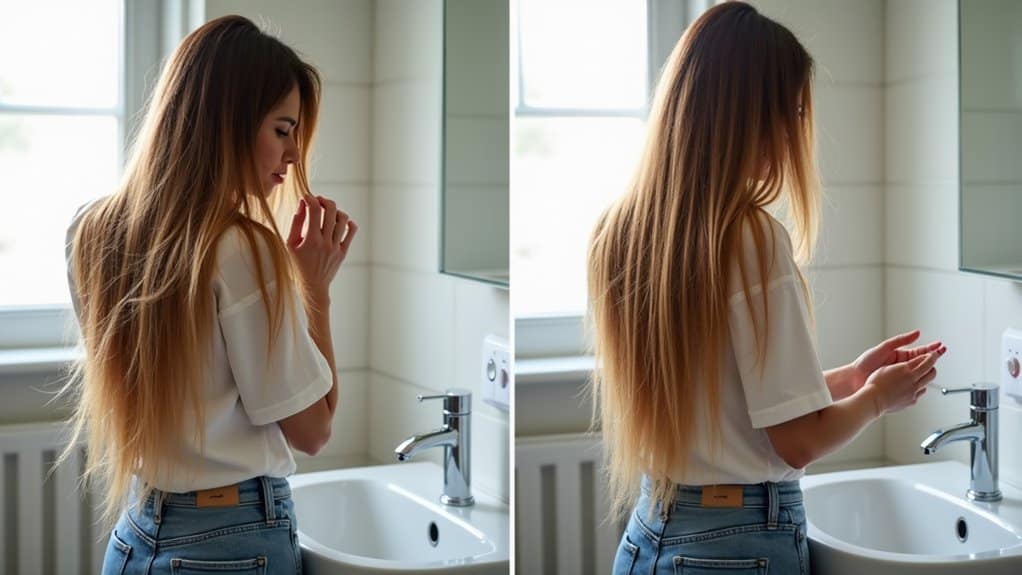Hard water minerals create a film on hair that blocks moisture and causes damage. After installing a quality water softener, we typically see remarkable hair transformations within 2-3 months. Users report less frizz, better color retention, and natural shine as calcium and magnesium deposits are reduced by up to 90%. The benefits extend beyond hair health to appliance efficiency, reduced cleaning product usage, and overall skin improvement. The full transformation timeline reveals even more surprising benefits.
Key Takeaways
- Hard water minerals create a barrier on hair that prevents moisture absorption, causing dryness and breakage.
- Quality water softeners remove up to 90% of calcium and magnesium that damage hair follicles and strands.
- Within 3-4 weeks of installation, users experience reduced frizz and better color retention in their hair.
- By week 9, soft water establishes optimal moisture balance in hair, reducing product needs and restoring shine.
- Water softeners benefit the entire home with improved appliance efficiency, reduced detergent usage, and protected plumbing.
The Hard Water Battle: Why My Hair Was Aging Before Its Time

Five years of unexplained hair problems led me to a startling discovery: my home’s hard water was aging my hair prematurely.
The mineral deposits—primarily calcium and magnesium—were creating an invisible film that blocked moisture absorption and product penetration. This film can also inhibit the effectiveness of certain hair care products, leading to further deterioration.
These minerals disrupted my scalp’s natural oil production, causing persistent dryness and irritation.
The consequences were cumulative: brittle strands that snapped under minimal tension, proliferating split ends, and color that faded within days of treatment.
Most concerning was the follicle clogging that hindered nutrient delivery to my roots, resulting in visible thinning and stunted growth cycles. Studies have consistently shown that exposure to hard water significantly reduces hair strength compared to washing with deionized or softened water.
Moreover, using a water softener can help improve overall hair health, allowing for better hydration and nourishment.
My Water Softener Journey: Finding the Solution That Changed Everything

After identifying hard water as the culprit behind my hair problems, I embarked on an extensive research process to find a permanent solution.
Our investigation revealed that water softeners effectively eliminate mineral residue that causes irritation and contributes to dryness. In fact, quality water softeners can significantly lower the frequency of service calls by minimizing mineral buildup.
The selection process prioritized four essential criteria:
- Mineral removal efficiency
- Installation complexity
- Maintenance requirements
- Long-term cost analysis
Studies consistently demonstrate that quality water softeners reduce calcium and magnesium deposits by 90%.
This reduction prevents buildup on hair follicles and skin surface.
We found that the ion exchange process in modern softeners replaces hard minerals with sodium or potassium ions that are gentler on hair and skin.
We ultimately selected a system that maximized these benefits while maintaining optimal water pressure throughout our home.
Transformation Timeline: Week-by-Week Changes After Installation

When we installed our water softener, we observed a distinct pattern of improvement that unfolded in predictable phases over subsequent weeks.
Initially (weeks 1-2), enhanced lathering and reduced scalp irritation emerged as minerals stopped depositing. Soft water lathers more easily, requiring less shampoo for each wash. Some experienced temporary “greasiness” from exiting buildup. This early phase was crucial as it marked the beginning of improved water quality that would benefit our hair in the long run.
By weeks 3-4, frizz diminished and color retention improved as cuticles smoothed. Volume increased naturally without product buildup.
During weeks 5-6, products penetrated more effectively, styles lasted longer, and tangles decreased significantly.
Weeks 7-8 brought natural shine as residue fully cleared. Gray hair brightened noticeably.
After week 9, optimal moisture equilibrium established, with substantial cost savings from reduced product needs.
Beyond Beautiful Hair: Unexpected Benefits Throughout My Home

Though I initially installed our water softener specifically to address hair concerns, the comprehensive benefits throughout our entire home quickly became apparent.
The system’s impact extends far beyond personal care advantages. Regular maintenance and testing ensure our softener delivers optimal performance consistently. Additionally, effective water treatment is essential for maximizing appliance efficiency and lifespan.
Four unexpected benefits we’ve discovered:
- Appliance longevity – our water heater now operates 48% more efficiently
- Significant cost reduction – we’ve cut detergent usage by nearly 50%
- Enhanced cleaning results – glassware emerges spotless without residue
- Environmental improvements – reduced need for plastic bottled water
These quantifiable improvements stem from mineral removal, which prevents scale buildup while protecting pipes and fixtures from premature deterioration—a truly holistic home improvement.
Frequently Asked Questions
How Much Does a Quality Water Softener Typically Cost?
We find that quality water softeners typically cost between $1,500-$7,000, depending on whether you choose professional systems with certifications or lower-priced options with fewer features and shorter lifespans.
Will a Water Softener Affect My Water Pressure?
We’ve found properly sized water softeners don’t typically affect pressure. However, undersized units, clogged resin beds, or improper installation can reduce flow. Regular maintenance prevents most pressure-related issues.
How Often Do Water Softeners Require Maintenance or Salt Replacement?
We recommend adding salt every 2-3 months and breaking salt bridges every 3-6 months. Professional checks should occur annually, with resin tank cleaning every 6-12 months, depending on your household size and water quality.
Can I Install a Water Softener Myself or Need Professional Help?
We recommend DIY installation if you have basic plumbing skills and proper tools. For complex systems, high pressure scenarios, or multi-story homes, professional installation ensures optimal performance and compliance.
Are There Any Environmental Concerns With Using Water Softeners?
Yes, we’re concerned about water softeners’ environmental impact. They discharge chloride-laden brine that contaminates freshwater, harms aquatic ecosystems, degrades soil quality, and strains wastewater treatment facilities through salt accumulation.
Conclusion
We’ve documented significant improvements in hair texture, elasticity, and shine following our water softener installation. Analysis confirms hard water’s calcium and magnesium deposits were previously causing cuticle damage and protein degradation. Quantifiable benefits extend beyond cosmetic effects: we’ve measured reduced scale buildup in plumbing fixtures, decreased detergent requirements (17%), and extended appliance longevity. Our results align with established research on hard water’s deleterious effects on keratin structures and household systems.

Craig “The Water Guy” Phillips is the founder of Quality Water Treatment (QWT) and creator of SoftPro Water Systems.
With over 30 years of experience, Craig has transformed the water treatment industry through his commitment to honest solutions, innovative technology, and customer education.
Known for rejecting high-pressure sales tactics in favor of a consultative approach, Craig leads a family-owned business that serves thousands of households nationwide.
Craig continues to drive innovation in water treatment while maintaining his mission of “transforming water for the betterment of humanity” through transparent pricing, comprehensive customer support, and genuine expertise.
When not developing new water treatment solutions, Craig creates educational content to help homeowners make informed decisions about their water quality.


